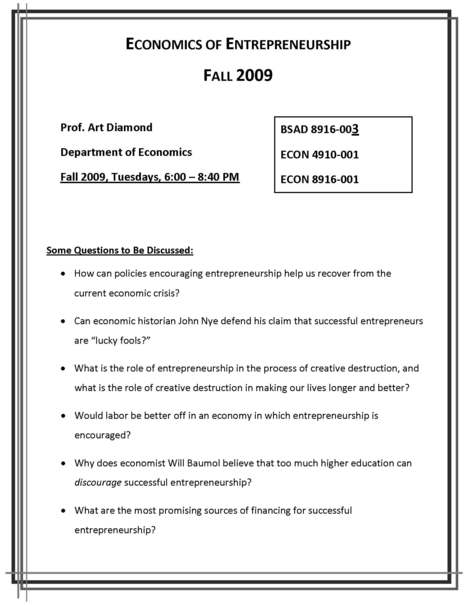
Gerald Gunderson. Source of photo: http://www.yorktownuniversity.com/faculty/gunderson.html
Gerald Gunderson, highlighted in the story quoted below, gave me some useful comments on my book project Openness to Creative Destruction at the April 2009 meetings of the Association of Private Enterprise Education.
Battles such as the one described below are easier to forgo than to fight. Gunderson has guts.
(p. A1) In one previously undisclosed fight, Trinity College in Connecticut is facing government scrutiny for its plan to spend part of a $9 million endowment from Wall Street investing legend Shelby Cullom Davis.
Trinity’s Davis professor of business, Gerald Gunderson, says he believed the plan, which would have funded scholarships for international students, violated the wishes of the late Mr. Davis. He alerted the Connecticut attorney general’s office. Then, Mr. Gunderson said in notes submitted to the agency, Trinity’s president summoned him to the school’s cavernous Gothic conference room, where he called the professor a “scoundrel” and threatened not to reappoint him.
Trinity said some of Mr. Davis’s family approved of the plan but it is now coming up with a new one, and declined to discuss the meeting.
. . .
(p. A14) The clash over the Davis gift has simmered on Trinity’s quiet campus of 2,200 students. Founded in 1823, the liberal-arts college has Episcopalian roots and Gothic architecture patterned after British universities.
In 1976, the school accepted a $750,000 gift from Mr. Davis, founder of a New York money-management firm who made a $900 million fortune investing in insurance stocks. Mr. Davis was a major benefactor to Wellesley College, Columbia University, Tufts University and his own alma mater, Princeton. But he had a personal connection to Trinity: His son-in-law was a graduate of the school and its campus overlooks downtown Hartford, an insurance hub.
In 1981, Trinity President Theodore D. Lockwood wrote to Mr. Davis that the fund, by then $1.6 million, was big enough to be tapped to create a Shelby Cullom Davis Professorship of American Business and Economic Enterprise. The letter listed several related activities, such as campus visits from business leaders. Mr. Lockwood also sought flexibility to use the money as the school saw fit “as conditions evolved and opportunities arose.”
In a return letter, Mr. Davis approved the professorship and activities Mr. Lockwood specified. But he rejected any other leeway. “It is my wish that the funds and income from the Endowment be used for the various purposes you have described…and for no other purposes.”
Trinity tapped Mr. Gunderson, an economic historian who shared Mr. Davis’s conservative political philosophy, to be the Davis professor.
The Davis fund grew beyond the needs of meeting Mr. Gunderson’s $155,000-a-year salary. By 2007, it reached $13.5 million, or 3% of Trinity’s total endowment, and generated more than $500,000 a year in income. After recent market declines, the fund is now estimated at $9 million.
Mr. Gunderson, 68 years old, says he complained for years that the school was starving the program and had rejected his frequent requests to add another full-time professor and a business-executive-in-residence program. The letter from Mr. Lockwood provides for the creation of a single professorship, but it doesn’t explicitly rule out adding another.
Mr. Gunderson says he suspects that liberal academics at Trinity have blocked these plans and have little interest in Mr. Davis’s vision. Mr. Gunderson, who is treasurer of the free-market nonprofit Yankee Institute, says some professors opposed his position in the 1970s in an economics department whose courses often stressed the downside of capitalism.
. . .
Last April, Trinity’s current president, James F. Jones Jr., sent Mr. Gunderson an email saying he had been looking for ways to use the “enormous” Davis fund to “benefit the College in ways different from merely watching the endowment continue to balloon because of the original strictures.” Mr. Jones said he had approached some Davis family members about using the money for financial aid for foreign students through another program the family had helped fund.
Mr. Gunderson replied that the college had entered into a binding contract with Shelby Cullom Davis, not his family. “Simply wishing things were different or saying that someone thinks it is a good idea is not sufficient and will not stand a legal challenge,” he wrote.
Following that exchange, Kathryn W. Davis, the donor’s 102-year-old widow, signed a document endorsing the use of her husband’s gift for the scholarships. But in an interview, she said the school hadn’t explained the restrictions her husband had outlined in his 1981 letter to the school, and said the endowment “should be used as my husband wished.”
The couple’s son, Shelby M.C. Davis, and grandson, Christopher C. Davis, both successful money managers, signed off on the fund’s use for scholarships.
Diana Davis Spencer, the donor’s daughter, says she only recently heard about the plan from Mr. Gunderson and is angry that Trinity didn’t contact her. Ms. Spencer, whose own philanthropy focuses on entrepreneurship, says her father would have opposed any change to the endowment’s mission. The university is “morally incorrect” and its plan “undermines donors’ confidence,” she says.
Trinity’s Mr. Joyce says the school believed key members of the family had been briefed.
After the April email exchange, Mr. Gunderson’s lawyer contacted the Connecticut attorney general’s office, which began its review. In the fall, Mr. Gunderson looked through financial data that the school had filed with the attorney general and noticed that about $200,000 of endowment money had been used to fund an internship program for college students over the past five years.
Mr. Gunderson says he was concerned in part because the school, facing a budget crunch, had tapped other restricted endowment money in 2004 but returned it after a faculty revolt. Trinity confirms this episode.
Mr. Joyce said Trinity this month reimbursed the Davis endowment for $191,337 spent on the internship program, though he said the original agreement still permits the school to spend a small amount annually on the initiative.
On Oct. 20, Mr. Jones, Trinity’s president, called Mr. Gunderson to the conference-room meeting. According to the professor’s notes, submitted to the attorney general, Mr. Jones called him “a liar and a bully,” threatened not to reappoint him and told him not speak to any other administrators. The notes said the president insisted on approving future spending from the Davis fund “down to a box of paperclips.”
Mr. Joyce, who said Mr. Jones wouldn’t be available for comment, declined to discuss the meeting. Mr. Joyce says he would be “very surprised” if Mr. Gunderson’s contract weren’t renewed when it comes up in July 2010.
In a February letter, the attorney general’s office told Trinity it could find no evidence that Mr. Davis intended the college or his family to have discretion to direct income from the endowment to purposes “other than the study and promotion of the economic theories of the free enterprise system.”
Mr. Joyce says Trinity scuttled its scholarship plan. The school intends to submit a new proposal to the attorney general and the Davis family on how it would spend excess Davis funds.
The attorney general, Richard Blumenthal, says he will consider the proposal. But he cautioned that colleges, despite financial pressures, can’t stray from donors’ intent: “There’s a vastly increasing temptation for schools to fill gaps or even launch new initiatives using money that was meant for another purpose.”
For the full story, see:
JOHN HECHINGER. “New Unrest on Campus as Donors Rebel.” Wall Street Journal (Thurs., April 23, 2009): A1 & A14.
(Note: ellipses added.)
Among Professor Gunderson’s publications is:
Gunderson, Gerald A. Wealth Creators: An Entrepreneurial History of the United States. 1st ed. New York: E.P. Dutton, 1989.
 “Students from Bridges Academy in Washington, D.C., at a Capitol Hill rally last month in support of the city’s Opportunity Scholarship Program, which gives students from low-income families scholarships for private schools.” Source of caption and photo: online version of the WSJ article quoted and cited below.
“Students from Bridges Academy in Washington, D.C., at a Capitol Hill rally last month in support of the city’s Opportunity Scholarship Program, which gives students from low-income families scholarships for private schools.” Source of caption and photo: online version of the WSJ article quoted and cited below.






